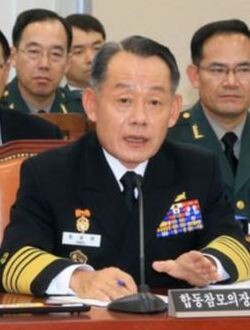hankyoreh
Links to other country sites 다른 나라 사이트 링크
Joint Chiefs of Staff downplaying remarks on military cooperation with Japan

By Park Hyun, Washington correspondent
Choi Yoon-hee, chairman of the Joint Chiefs of Staff, moved to downplay remarks he made on Mar. 11 which have aroused controversy, insisting that the remarks were theoretical. During a visit to the US, Choi said that cooperation was needed between the US, South Korea, and Japan and promised to push for cooperation with Japan in areas of security.
After Choi paid his respects at the memorial for veterans of the Korean War in Washington, D.C., a reporter asked him about the issue of security cooperation with Japan. Choi said South Korea, the US, and Japan “need to cooperate on security against the North Korea threat” and pledged to “cooperate in a forward-thinking way while examining things as they unfold, including relations between South Korea and Japan.”
When critics responded that it is not appropriate to engage in military cooperation with Japan right now, since the country has been rapidly shifting to the right and denying historical facts in recent month, the Joint Chiefs immediately issued a statement elaborating their position.
“The remarks about constructive cooperation between South Korea and Japan on security matters were mentioned as matter of principle. They meant that we will cooperate depending on relations between South Korea and Japan. They did not mean that we will move forward with some kind of military cooperation with Japan right away,” the Joint Chiefs said in the statement. “Fundamentally, cooperation on security issues will proceed according to the government’s position.
The scene recalls the Korea-Japanese General Security of Military Information Agreement in 2012, which was kept secret during the negotiation phase. The agreement was nullified after the public responded angrily.
This is not the first time that a high-ranking public official’s comments about Japan have become the subject of controversy. Defense Minister Kim Kwan-jin was criticized in February when he responded to indications that Japan would exercise its right to collective defense by saying that the decision was Japan’s to make.
National Security Chief Kim Jang-soo, who is responsible for implementing policies related to diplomacy and national security, also provoked debate when he told South Korean foreign correspondents in Washington, D.C. on Oct. 25, 2013 that “The right to collective self-defense appears in the UN Charter and is a right that belongs to ordinary countries. It is not something for us to tolerate or reject, but it is rather a choice that the Japanese people must make.”
In related news, in regard to the question of the US transferring wartime operational control to South Korea, which is scheduled to take place at the end of 2015, Choi said that there would be a discussion with American officials on the same day. “This is the time to assess the conditions for receiving operational control from the US, and following this assessment a careful review will take place,” Choi said.
Asked whether a final decision would be made in the first half of 2014 about whether to delay the transfer once again, Choi said it was not the right time to comment on the timing.
Please direct questions or comments to [english@hani.co.kr]

Editorial・opinion
![[Column] Has Korea, too, crossed the Rubicon on China? [Column] Has Korea, too, crossed the Rubicon on China?](https://flexible.img.hani.co.kr/flexible/normal/500/300/imgdb/original/2024/0419/9317135153409185.jpg) [Column] Has Korea, too, crossed the Rubicon on China?
[Column] Has Korea, too, crossed the Rubicon on China?![[Correspondent’s column] In Japan’s alliance with US, echoes of its past alliances with UK [Correspondent’s column] In Japan’s alliance with US, echoes of its past alliances with UK](https://flexible.img.hani.co.kr/flexible/normal/500/300/imgdb/original/2024/0419/2317135166563519.jpg) [Correspondent’s column] In Japan’s alliance with US, echoes of its past alliances with UK
[Correspondent’s column] In Japan’s alliance with US, echoes of its past alliances with UK- [Editorial] Does Yoon think the Korean public is wrong?
- [Editorial] As it bolsters its alliance with US, Japan must be accountable for past
- [Guest essay] Amending the Constitution is Yoon’s key to leaving office in public’s good graces
- [Editorial] 10 years on, lessons of Sewol tragedy must never be forgotten
- [Column] A death blow to Korea’s prosecutor politics
- [Correspondent’s column] The US and the end of Japanese pacifism
- [Guest essay] How Korea turned its trainee doctors into monsters
- [Guest essay] As someone who helped forge Seoul-Moscow ties, their status today troubles me
Most viewed articles
- 1[Column] The clock is ticking for Korea’s first lady
- 2[Column] Has Korea, too, crossed the Rubicon on China?
- 3After 2 months of delayed, denied medical care, Koreans worry worst may be yet to come
- 4US overtakes China as Korea’s top export market, prompting trade sanction jitters
- 5[Editorial] When the choice is kids or career, Korea will never overcome birth rate woes
- 6[Correspondent’s column] In Japan’s alliance with US, echoes of its past alliances with UK
- 7Hong Se-hwa, voice for tolerance whose memoir of exile touched a chord, dies at 76
- 8Nearly 1 in 5 N. Korean defectors say they regret coming to S. Korea
- 9John Linton, descendant of US missionaries and naturalized Korean citizen, to lead PPP’s reform effo
- 10Strong dollar isn’t all that’s pushing won exchange rate into to 1,400 range